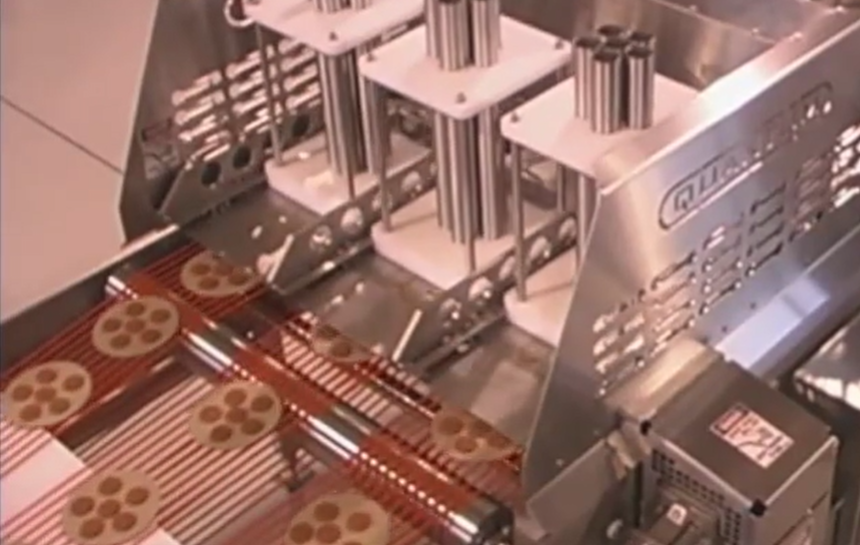What are the most important things to look for in buying a machine for automation?
Whether you’re looking to start automating your food manufacturing, or better equipment to optimize your workflow, the kind of machines you use are critical to ensure volume, quality control, and consistency.
Machines are expensive – being a savvy consumer is important before making the decision to buy. When assessing your current food manufacturing equipment, consider these three key aspects:
- Safety – Equipment that is resistant to the growth of micro-organisms, and has parts that are easy to access for both cleaning purposes, along with proper training and methodologies for cleaning those machines.
- Versatility – Equipment that has multiple functions for a variety of products, while providing uniform consistency
- Efficiency – Equipment that works at an optimal speed for your workflow.
Read more about how these factors play an important role in food manufacturing.
Safety
Food manufacturing is a highly regulated industry due to risk factors like listeria, salmonella, and E. coli – proper hygiene is something that every food plant needs to consider when assessing their machines.
Many companies focus on the importance of PPE, and implementing safety protocols to ensure a lack of contamination. It is true that the source of many outbreaks come from a lax approach to these methods, or failing to provide adequate training.
However, as manufacturing continues to push towards automation, manufacturers should look beyond just workers and towards the equipment that they are using. This includes:
- Easy Cleaning – Inspection, maintenance, and cleaning times can all be dramatically reduced by having machines that are easy to assemble and disassemble. Occasional deep cleaning around areas like a machine’s vital control systems fight growth in places that it can grow unnoticed.
- Materials – Equipment needs to be built out of durable materials like stainless steel that are resistant to bacteria and common cleaning chemicals. Plastics have become common on conveyor systems, as it reduces the amount of time spent cleaning by a significant margin.
- Bacteria-Resistant Design – Effective machine design doesn’t stop at how quickly you can clean a machine, but how well the machine is at fighting off bacterial growth. Self-draining machines help prevent liquid buildup where germs thrive, and air-tight design can create an environment unsuitable for bacteria.
Sound manufacturing practice starts with the right machines, and can save manufacturers up to $1.5 million per year by minimizing the likelihood of recalls. While good training, rigorous hygienic standards, and designing a factory around hygienic zoning and optimized layouts are all critical to this process, it starts with having the right machines.
Versatility
Food manufacturing depends on producing quality and consistency in the shortest amount of time possible to net a profit. It also relies on having a wide assortment of offerings that appeal to your customer base.
Automation is becoming the standard practice in food manufacturing, but in order to provide value, they should produce uniform results with multiple variations of your product. What does this mean?
Consider a pepperoni meat slicer. Our line of industrial meat slicers can quickly and evenly apply disks of pepperoni to the top of a pizza, but is not exclusively limited to one ingredient. For instance, a meat slicing machine can serve as a salami slicing machine (or any type of deli-style meat), and can even be configured to cut cheese.
Look for machines that come with customizability as one of their primary features. There is no one-size-fits-all approach to food manufacturing, and companies designing the equipment for automation should be compliant with any requests for testing. Our pizza sauce applicator machines are customized with unique pattern plates consistent with the viscosity and particulate matter of a customer’s sauce, giving our sauce applicator the flexibility to work with a variety of different products.
Efficiency
Automation has been heralded as the future of global manufacturing, and companies looking towards the future have embraced the potential and ROI that this equipment offers.
When asking yourself “do I have the right food manufacturing equipment?” consider the costs and benefits that implementing automation can have for your company. Turnover in manufacturing has been rising steadily for almost half a century, and conversely, it has been estimated by the McKinsey Institute that by 2030 half of all activities people are paid to perform will have the potential to be automated.
Aside from the money being lost by high turnover, automation can typically perform at a much higher rate of efficiency than manual application of ingredients. Costs are further lowered by keeping workers safe and preventing accidents on the factory line.
The Most Important Things to Look For in Automation Depend on Utility
When looking at your factory line and examining it for inefficiencies, consider what aspects are costing you the most in terms of waste, and what parts can be optimized. Does a pizza need ingredients added by hand, or can I use a pizza topping machine or pizza topping applicator to do the work for me?
Maintenance, cleaning, workplace injuries, and recalls are common threats to the bottom line of food manufacturing. These problems can be addressed by good machine design and sensible investments in automation.
At Quantum Technical Services, our machines are designed to meet the needs of food manufacturers, with a specialty in pizza manufacturing and baked goods manufacturing. Contact us today to learn more.

